25 Dividend Stocks the Analysts Love the Most
These blue-chip dividend stocks with yields of at least 3% are among the favorite stock picks of Wall Street's analyst community at the moment.

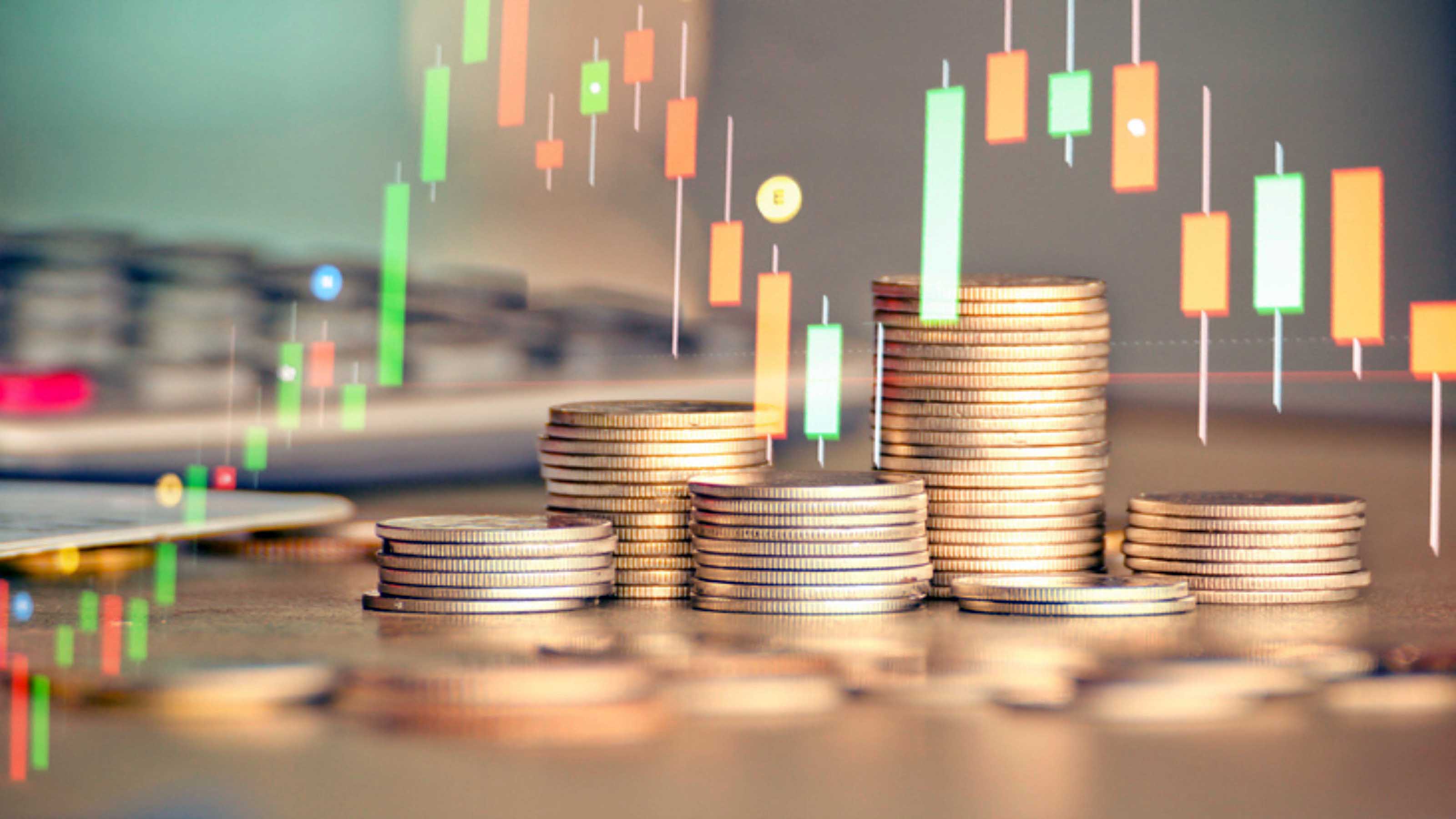
Profit and prosper with the best of Kiplinger's advice on investing, taxes, retirement, personal finance and much more. Delivered daily. Enter your email in the box and click Sign Me Up.
You are now subscribed
Your newsletter sign-up was successful
Want to add more newsletters?

Delivered daily
Kiplinger Today
Profit and prosper with the best of Kiplinger's advice on investing, taxes, retirement, personal finance and much more delivered daily. Smart money moves start here.

Sent five days a week
Kiplinger A Step Ahead
Get practical help to make better financial decisions in your everyday life, from spending to savings on top deals.

Delivered daily
Kiplinger Closing Bell
Get today's biggest financial and investing headlines delivered to your inbox every day the U.S. stock market is open.

Sent twice a week
Kiplinger Adviser Intel
Financial pros across the country share best practices and fresh tactics to preserve and grow your wealth.

Delivered weekly
Kiplinger Tax Tips
Trim your federal and state tax bills with practical tax-planning and tax-cutting strategies.

Sent twice a week
Kiplinger Retirement Tips
Your twice-a-week guide to planning and enjoying a financially secure and richly rewarding retirement

Sent bimonthly.
Kiplinger Adviser Angle
Insights for advisers, wealth managers and other financial professionals.

Sent twice a week
Kiplinger Investing Weekly
Your twice-a-week roundup of promising stocks, funds, companies and industries you should consider, ones you should avoid, and why.

Sent weekly for six weeks
Kiplinger Invest for Retirement
Your step-by-step six-part series on how to invest for retirement, from devising a successful strategy to exactly which investments to choose.
When it comes to Wall Street's favorite dividend stocks, the pros are all about energy companies and utilities these days.
Whether it's an increase in residential energy needs or a nascent recovery in commodity prices, analysts' most highly rated dividend stocks – firms such as oil and gas drillers, electric utilities, pipeline companies, oilfield services and other sector names – find themselves heavily over-represented.
To find analysts' favorite dividend stocks, we scoured the S&P 500 for dividend stocks with yields of more than 3%, excluding a number of extremely high yielders because of excessive risk. (Sometimes, a too-high yield can be a warning sign that a stock is in deep trouble.)
From that pool, we focused on stocks with an average broker recommendation of Buy or better. S&P Global Market Intelligence surveys analysts' stock ratings and scores them on a five-point scale, where 1.0 equals Strong Buy and 5.0 means Strong Sell. Any score of 2.5 or lower means that analysts, on average, rate the stock a Buy. The closer the score gets to 1.0, the stronger the Buy call.
Lastly, we dug into research and analysts' estimates on the top-scoring names.
That led us to these top 25 dividend stocks, by virtue of their high analyst ratings and bullish outlooks. Read on as we analyze what makes each one stand out.
Stock prices, dividend yields, analyst ratings and other data are as of Oct. 13, unless otherwise noted. Companies are listed by strength of analysts' average rating, from lowest to highest. Dividend yields are calculated by annualizing the most recent payout and dividing by the share price.

25. Exelon
- Market value: $39.9 billion
- Dividend yield: 3.7%
- Analysts' average rating: 2.05
The coronavirus crisis has hurt commercial and industrial demand for energy, but it has also boosted residential demand. That bodes well for Exelon (EXC, $40.98), a utility that generates electricity from nuclear, fossil, wind, hydroelectric, biomass and solar generating plants.
And with bonds bearing paltry yields, utility stocks such as Exelon have become more attractive for cautious income investors.
"Exelon is one of a few utilities that we think can serve as a core holding in a diversified portfolio, based on the company's positive results and guidance outperformance," says Argus Research (Buy), which covers a large number of energy stocks. "The current yield … is above the average for electric utility stocks. We see the defensive characteristics of utilities such as Exelon as particularly attractive during periods of low interest rates."
Of the 19 analysts covering the dividend stock who are tracked by S&P Global Market Intelligence, seven rate it at Strong Buy, seven say Buy, three have it at Hold and one says Sell. They also see decent growth ahead. The pros' average price target of $46 per share gives EXC implied upside of about 12% over the next 12 months or so.

24. Chevron
- Market value: $141.3 billion
- Dividend yield: 7.0%
- Analysts' average rating: 2.0
The lone energy play among the 30 Dow stocks is getting bigger – much bigger. In early October, Chevron (CVX, $73.40), one of the highest-yielding dividend stocks on this list, completed its acquisition of Noble Energy, which had a market value of more than $4 billion as a publicly traded company.
UBS applauded the deal, calling it a "bolt-on at an extremely attractive price" and noting that few firms but CVX could have pulled it off.
"Chevron's strong financial status placed it rather uniquely in the context of its peers that would ordinarily all be looking for acquisition opportunities at the bottom of the cycle (although some may now be more focused in the renewables space)," said UBS, which rates shares at Hold.
UBS isn't in the majority with its rating, however. Eight of the 25 analysts covering the stock tracked by S&P Global Market Intelligence call CVX a Hold, but 10 rate it a Strong Buy, and another six say Buy. Meanwhile, just one says it's a Sell.
It's also worth noting that while Chevron is struggling this year because of COVID's hit on oil prices, CVX was able to generate free cash flow (after paying interest on debt) of about $13 billion for two consecutive years.
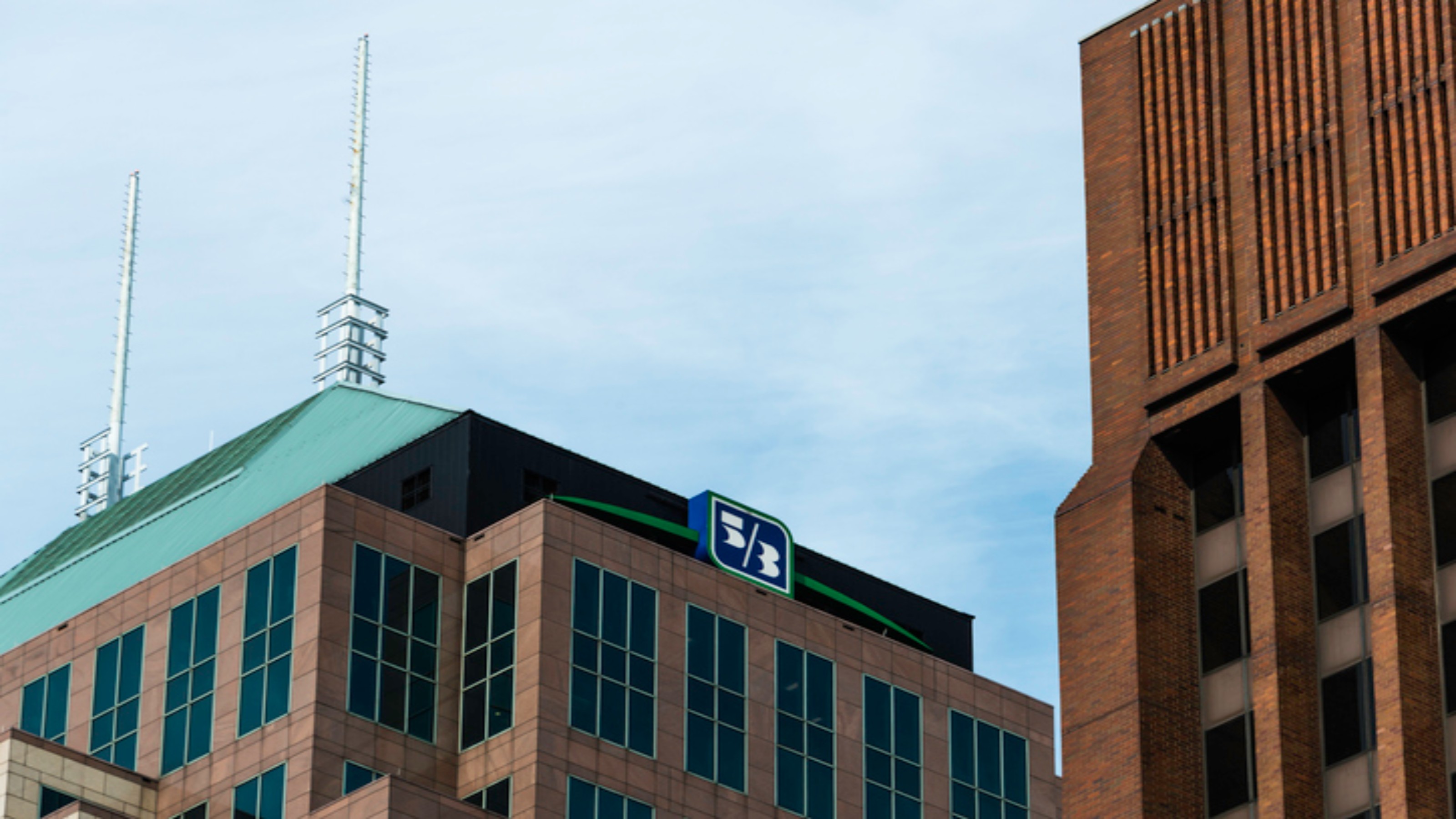
23. Fifth Third Bancorp
- Market value: $16.5 billion
- Dividend yield: 4.7%
- Analysts' average rating: 1.96
CFRA calls regional bank Fifth Third Bancorp (FITB, $23.12) a coronavirus recovery play.
"The 15th largest bank in the U.S. by assets, FITB maintains a strong presence in Midwest U.S and continues to gain market share through its strategy to grow middle-market commercial lending, deepen industry verticals, and expand further into the faster-growing Southeast," says CFRA, which calls FITB shares a Buy.
CFRA's bullish stance is supported in part by the bank's "attractive valuation and a high dividend yield." Its analysts expect the lender to benefit from declining credit headwinds as the U.S. economy recovers from the Covid-19 shock.
"As local economies fully reopen and the economic landscape shows stability, improved fundamentals should drastically reduce credit costs associated with FITB's loan portfolio with sizable exposure to commercial real estate," CFRA adds.
Fifth Third is generous as far as dividend stocks go, yielding nearly 5% at present. Analysts expect FITB to generate average annual earnings growth of 9.3% over the next three to five years, according to S&P Global Market Intelligence. They're also largely bullish, with 10 Strong Buys and six Buys versus six Holds and just one Strong Sell.
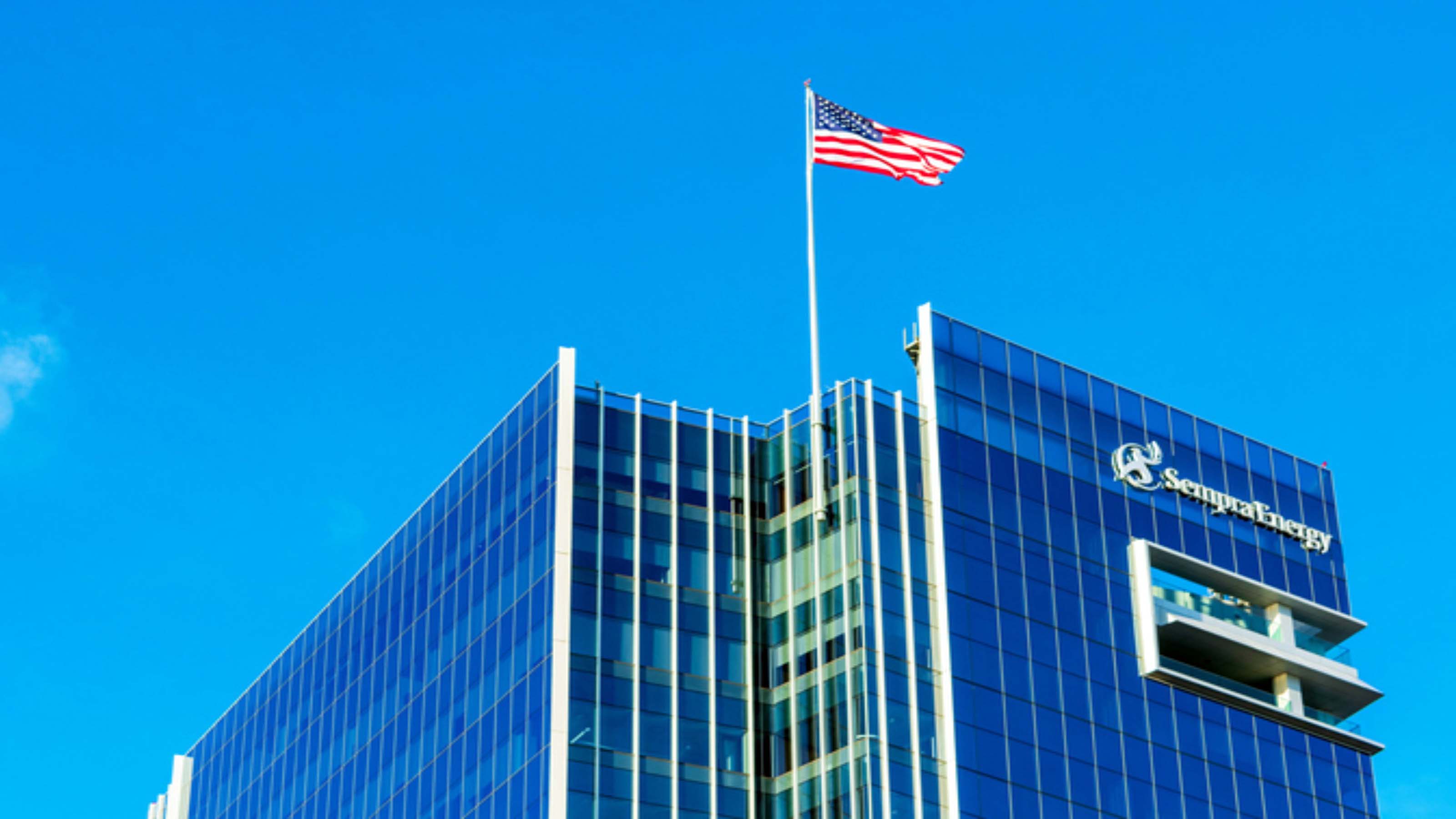
22. Sempra Energy
- Market value: $36.6 billion
- Dividend yield: 3.3%
- Analysts' average rating: 1.94
Sempra Energy (SRE, $126.55) is another energy stock that should benefit from current industry trends. The electric and natural gas infrastructure company is expected to hold up better during the pandemic than stocks in discretionary sectors, says Argus Research.
"We expect higher residential electricity usage from increased working and learning at home to boost kilowatt-hour sales at Sempra and other utilities," say Argus's analysts, who rate shares at Buy. "We also expect Sempra to benefit from rising commercial and industrial kWh demand as businesses reopen in its Southern California service territory."
Investors in dividend stocks will be happy to know that over the past five years, Sempra has raised its dividend at a compound annual rate of 6.7%. Argus Research's dividend estimates are $4.20 for 2020 and $4.38 for 2021.
Lastly, Sempra has a pretty attractive long-term growth rate for a utility. Analysts on average forecast earnings growth of 7.3% annually for the next three to five years, according to S&P Global Market Intelligence.

21. Truist Financial
- Market value: $57.4 billion
- Dividend yield: 4.2%
- Analysts' average rating: 1.92
Truist Financial (TFC, $42.60), a regional lender and the sixth-largest U.S. bank by assets, is popular with Wall Street analysts. TFC gets 10 Strong Buy ratings, six Buy ratings and eight Hold calls from the 24 analysts covering the stock.
Truist was formed in December 2019 by the merger of regional banks BB&T and SunTrust Banks – a deal that should serve it well once the pandemic has run its course, analysts say.
"The rationale for Truist – scale, scope and the capacity to invest – has been made even more clear by all that's transpired," says Credit Suisse, which rates the stock at Neutral (equivalent of Hold). "Scale is incrementally more important as is scope, i.e., a complete product set plus diversification, and the capacity to service customers however they choose."
On a positive note, Truist is seeing some loan growth and deposit flows remain "solid and sticky," says Credit Suisse. The broader analyst community forecasts the bank to deliver average annual earnings growth of 5% over the next three to five years.
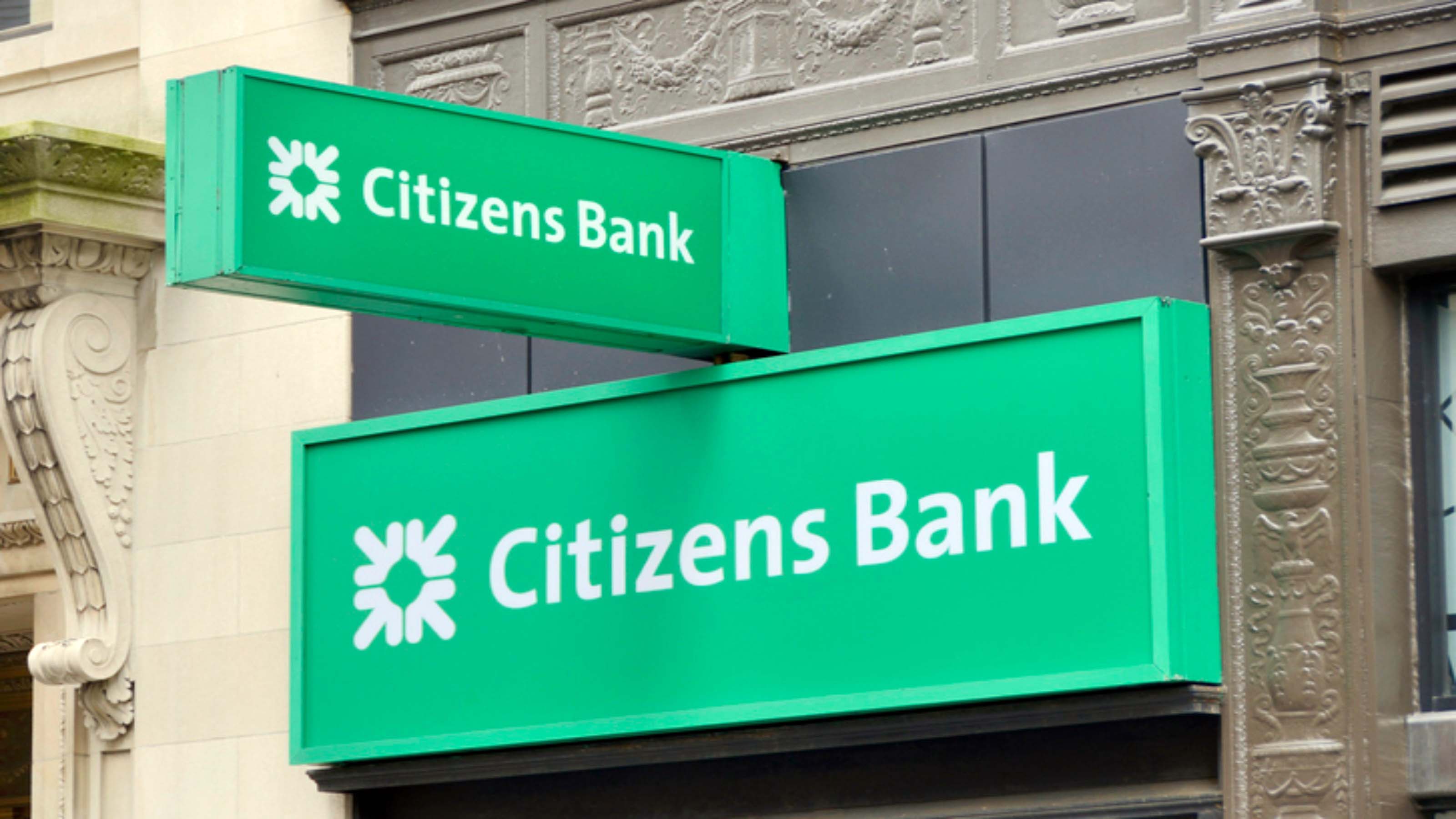
20. Citizens Financial
- Market value: $12.0 billion
- Dividend yield: 5.6%
- Analysts' average rating: 1.91
Citizens Financial (CFG, $28.02), another regional lender, gets a thumbs-up from most of the analysts on the Street.
"We generally favor regionals over money centers," says UBS, which rates the stock at Buy. "Ultimately, leverage to falling loan loss reserves, self-help opportunities and valuation discounts underlie our preferences. Citizens Financial and Fifth Third Bancorp are our top picks."
Of the analysts covering CFG, nine call it a Strong Buy, seven have it at Buy, four says it's a Hold and one rates it at Strong Sell.
Citizens looks like one of the most generous dividend stocks on this list. The bank has raised its quarterly payout every year over the past half-decade, most recently to 39 cents a share. That represents an improvement of 290% over the 10 cents a share it paid in 2016.
But CFG is more than a dividend growth play – analysts' average price target of $30.93 gives the stock implied upside of about 10% over the next year or so.

19. Boston Properties
- Market value: $12.4 billion
- Dividend yield: 4.9%
- Analysts' average rating: 1.91
Real estate investment trusts (REITs) are having a rough 2020, and Boston Properties (BXP, $79.76) is having an even tougher time than most.
Shares in the owner and developer of top-shelf office properties have tumbled 40% so far this year. That compares unfavorably to the REIT sector of the S&P 500, which is down about 5%.
But analysts think the selloff has made Boston Properties' stock attractive on a valuation basis, and applaud the quality of its real estate portfolio and development pipeline. Such strengths should help BXP outperform when the pandemic is largely behind us.
"While the coronavirus has decreased the demand for office space, we think the gradual reopening of the economy will benefit BXP over time," says Argus Research, which rates the stock at Buy. "The company's $2.8 billion development pipeline is focused on coastal markets mostly outside New York City. We see this as a competitive advantage relative to peers whose rents are being pressured by rising supply."
Of the 21 analysts covering the stock tracked by S&P Global Market Intelligence, 10 rate it at Strong Buy, three say Buy and eight have it at Hold. Their average target price of $106.52 gives BXP implied upside of 33% over the next 12 months or so. That doesn't even include the 5% in yield you'd be collecting along the way.

18. Entergy
- Market value: $21.3 billion
- Dividend yield: 3.5%
- Analysts' average rating: 1.89
Entergy (ETR, $106.48) is yet another electricity utility that the Street likes for income and defense. Of the analysts covering the stock, eight say it's a Strong Buy, four say Buy and six have it at Hold.
UBS analysts are in the Buy camp, and note that ETR expects to align its dividend growth rate with its earnings per share (EPS) growth rate in the third quarter of 2021. UBS expects the utility's EPS to increase at an annual rate of 5% to 7% from now through 2024.
That growth forecast is in line with the Street's consensus view. A survey of all 18 analysts covering Entergy expect the firm to generate average annual earnings growth of 6%.
Entergy should also benefit from its investments in environmental, social and governance (ESG) initiatives. The company plans to retire 100% of its coal plants over the next 10 years.
ETR's recent results serve to "highlight the quality of the company's current business, and its strong growth prospects into the future," says UBS.
The Pros' Picks: 9 Stocks to Sell Now

17. EOG Resources
- Market value: $22.5 billion
- Dividend yield: 3.9%
- Analysts' average rating: 1.88
Wall Street's pros think dividend stocks in the beaten-down oil and gas exploration and production industry are a good place to hunt for bargains, and they've alighted on EOG Resources (EOG, $38.64) as one of their favorite picks.
If nothing else, EOG certainly is beaten down. Shares have lost 54% for the year-to-date, which is about par for the sector, and represents painful underperformance vs. the broader market, which is up almost 9%.
CFRA notes that part of the selloff is due to the fact that EOG holds many drilling permits on a wide swath of federal land. Joe Biden's energy plan calls for sunsetting federal drilling permits should he become the next president of the U.S.
"Overall, we think EOG is being unreasonably penalized," says CFRA, which rates the stock at Buy. "EOG is being adversely affected by its high 25% share of acreage on federal land. Upon further reflection though, we think investors are not giving its overall portfolio enough credit."
CFRA adds that there are reasons to be skeptical of oil and gas producers in a world that remains under pressure from COVID-19, "but we view EOG as a best-of-breed producer."
The majority of Wall Street's experts are in the same bull camp. Fifteen analysis rate the stock at Strong Buy, seven say Buy and 11 call it a Hold, according to S&P Global Market Intelligence.
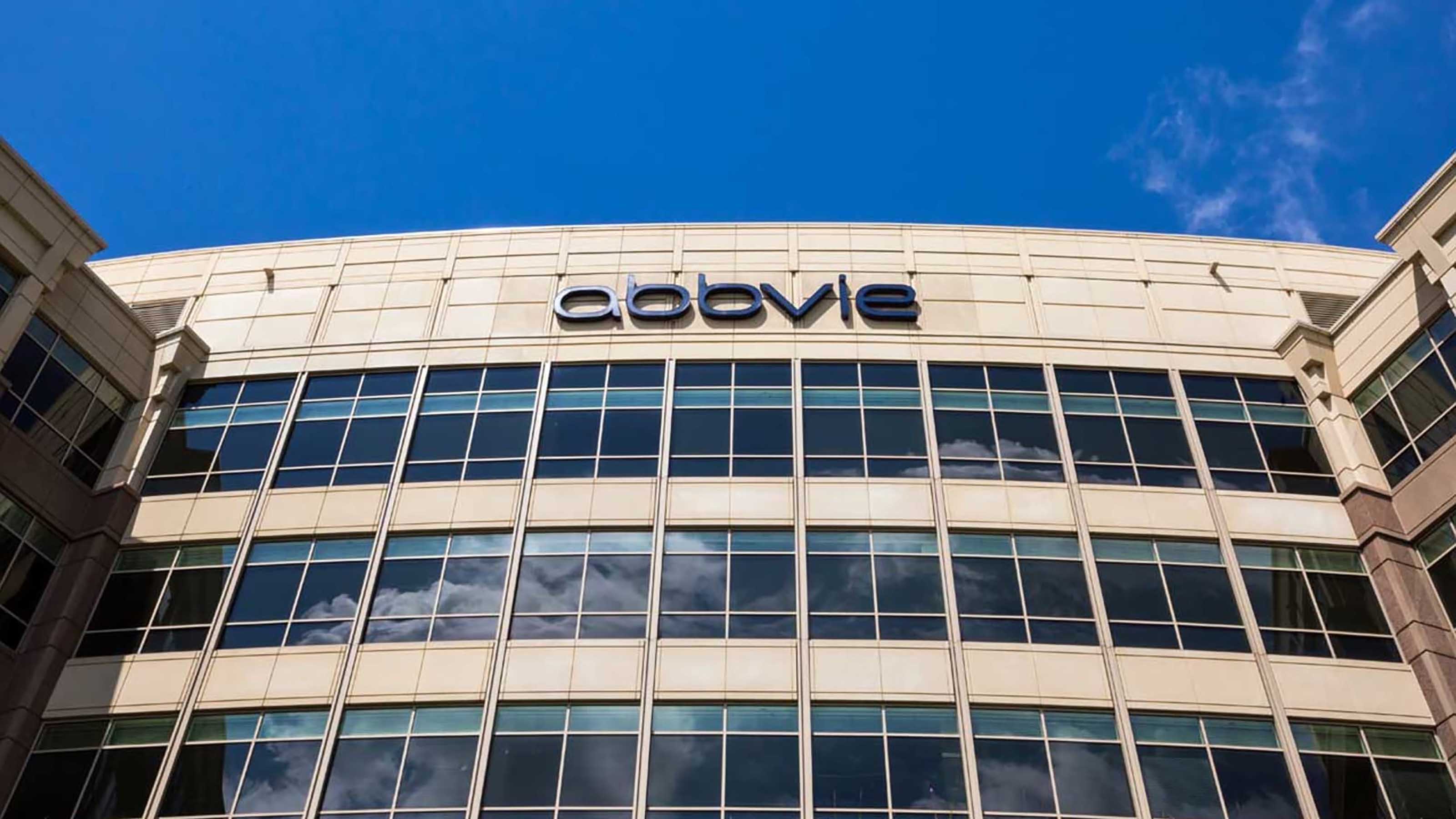
16. AbbVie
- Market value: $155.0 billion
- Dividend yield: 5.4%
- Analysts' average rating: 1.84
AbbVie (ABBV, $86.65), the first health care stock on our list, should be very familiar to long-term dividend investors. That's because the pharmaceutical company is a Dividend Aristocrat, by virtue of having raised its dividend for 48 consecutive years. Even better, Argus Research, which rates the stock at Buy, notes that ABBV has hiked its dividend at a 20% rate over the past five years.
On a more bearish note, CFRA says AbbVie's future sales could be at risk if a new administration tackles drug-price reform. Two of the company's best-selling drugs – Humira and Imbruvica – account for 55% of ABBV's 2020 sales, and they're boosted by Part D Medicare spending.
"As a result, we think ABBV's drug price reform risk is high relative to peers," says CFRA, which rates the stock at Hold.
Most analysts remain optimistic about ABBV despite the risk from drug-price reform. Of the 19 analysts covering the stock tracked by S&P Global Market Intelligence, nine call it a Strong Buy, four say Buy and six rate it at Hold.
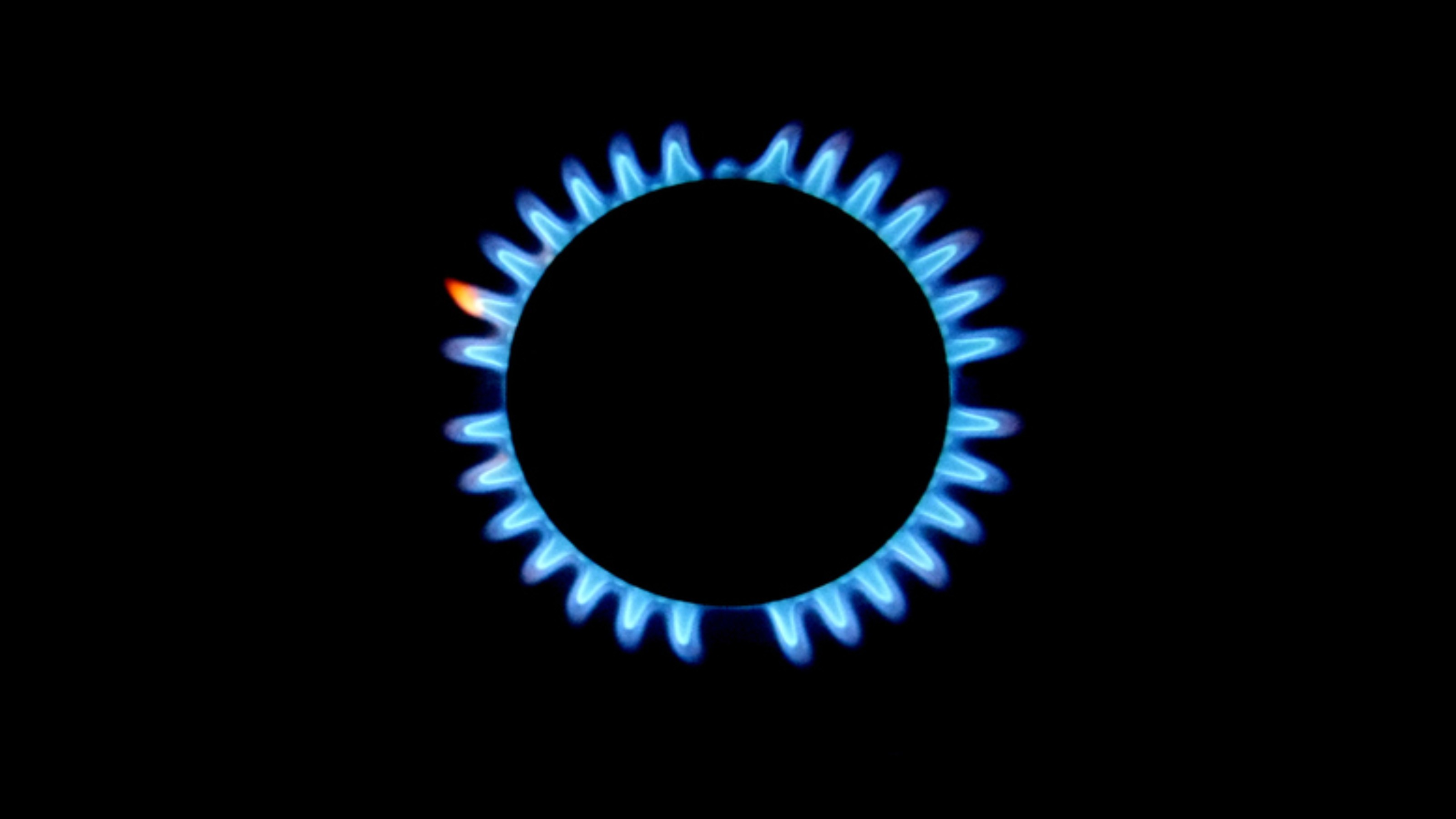
15. NiSource
- Market value: $8.9 billion
- Dividend yield: 3.6%
- Analysts' average rating: 1.79
NiSource (NI, $23.11), a natural gas and electricity utility, finds itself among analysts' favorite dividend stocks.
NiSource is the third-largest U.S. gas distribution utility and the fourth-largest gas pipeline company, and provides electric utility services in Northern Indiana. The company has pledged to retire all of its coal-fired electric generation plants by 2028. One concern analysts have, however, is how that pledge could change with Joe Biden in the White House.
"We also acknowledge the commitment to clean energy is a good first step," says CFRA, which rates the stock at Hold. "Still, if Biden is elected, NI could potentially see a requirement to retire its coal faster-than-expected, ultimately limiting the cash flow it currently expects to extract from those plants."
Regardless, the majority of the Street is bullish on the name. Six analysts rate NI shares at Strong Buy, five say Buy and three call them a Hold. The pros expect the utility to generate average annual earnings growth of 5.7% for the next three to five years.

14. CVS Health
- Market value: $77.4 billion
- Dividend yield: 3.4%
- Analysts' average rating: 1.79
As a pharmacy chain, pharmacy benefits manager and health insurance company CVS Health (CVS, $59.12) has a unique profile in the health care sector. It's also getting a boost on the top and bottom lines from the COVID-19 outbreak.
Not that the market has noticed. Shares in CVS are off about 20% for the year-to-date. Indeed, shares are languishing so far behind its growth prospects, CVS now trades at less than 8 times 2021 earnings, making it one of the lowest-priced dividend stocks on this list.
"CVS appears to be deeply discounted and undervalued, in our opinion, as it is trading at only 7.8 times our 2021 earnings-per-share estimate," says CFRA, which rates shares at Buy. "We believe that confusion about business dynamics across the company's three major businesses during the pandemic has limited investor interest in the name."
Investors looking for income equities should just note that while CVS has a strong payment history, it ended its 14-year streak of dividend hikes in 2018. The company kept its payout level, choosing instead to divert cash toward paying off its debt, which ballooned when it assumed $8 billion of Aetna's debt after it acquired the insurer in 2018.
But you're getting a stronger balance sheet as a result. Analysts write that CVS Health has paid down $8 billion since the close of the Aetna transaction, and it plans to pay down another $3.8 billion in debt this year.

13. Devon Energy
- Market value: $3.6 billion
- Dividend yield: 4.6%
- Analysts' average rating: 1.75
Devon Energy (DVN, $9.50) is popular with the Street thanks in part to a recent $2.7 billion deal in which the oil and gas exploration and production company will merge with rival WPX Energy.
"The combined company will be a leading U.S. unconventional oil producer, with a premium acreage position in the Delaware Basin," says Argus Research, which rates DVN at Buy. "We expect Devon to emerge from the current downturn as a stronger company and to take advantage of its high-quality portfolio when commodity prices recover."
Bullish analysts outnumber those sitting on the fence 3-to-1. And no analysts are bearish. Of the 28 analysts covering DVN tracked by S&P Global Market Intelligence, 14 rate it at Strong Buy seven say Buy and seven call it a Hold. There are no sell recommendations on shares.
Analysts expect the energy company to deliver average annual earnings growth of 7.5% for the next three to five years. Their average price target of $16.49 gives DVN huge implied upside of 73% in just the next year.

12. Marathon Petroleum
- Market value: $19.1 billion
- Dividend yield: 7.9%
- Analysts' average rating: 1.75
Marathon Petroleum (MPC, $29.38), which refines, markets, transports and retails petroleum products in the U.S., has seen its shares lose a little more than half their value in 2020.
But analysts are beating the drum telling their clients to buy low.
Seven of the 26 analysts covering MPC tracked by S&P Global Market Intelligence rate the stock at Strong Buy, while six have it at Buy. Three call it a Hold and no analysts have MPC at Sell.
Analysts at Cowen, who rate the stock at Outperform (Buy), say the market is underappreciating MPC's capitalization improvement after the $21 billion sale of its Speedway convenience-store chain.
"We see additional upside not contemplated in our $43 price target and independent of improving refining margins or crude differentials," says Cowen. "This includes restructuring opportunities that could be particularly attractive if the long-term margin outlooks dims and a potential cost-cutting program to bring (operating expenses) more in-line with peers."
Analysts' average price target of $47.20 implies that they see MPC running 60% higher over the next 12 months or so.

11. Edison International
- Market value: $21.3 billion
- Dividend yield: 4.5%
- Analysts' average rating: 1.73
Edison International (EIX, $56.28), which generates electricity for 5 million customers in California, is another utility that analysts like for defense and generous dividends.
The first glaring risk that comes to investors' minds with this name is the impact of California's seemingly relentless wildfires and other natural disasters. But analysts say public and policy support ensure that the risk is adequately reflected in the company's stock price.
"Although wildfire season is unpredictable, the state fund and liability reform has helped," notes UBS, which calls the stock a Buy.
Eight of the 15 analysts covering the stock tracked by S&P Global Market Intelligence call EIX a Strong Buy, while three more say Buy. Four have it at Hold and no one says to sell the stock.
Collectively, the pros expect DVN to deliver average annual earnings growth of 5% over the next three to five years. Meanwhile, they estimate about 18% upside over the next 12 months, based on their 12-month price target of $56.28.
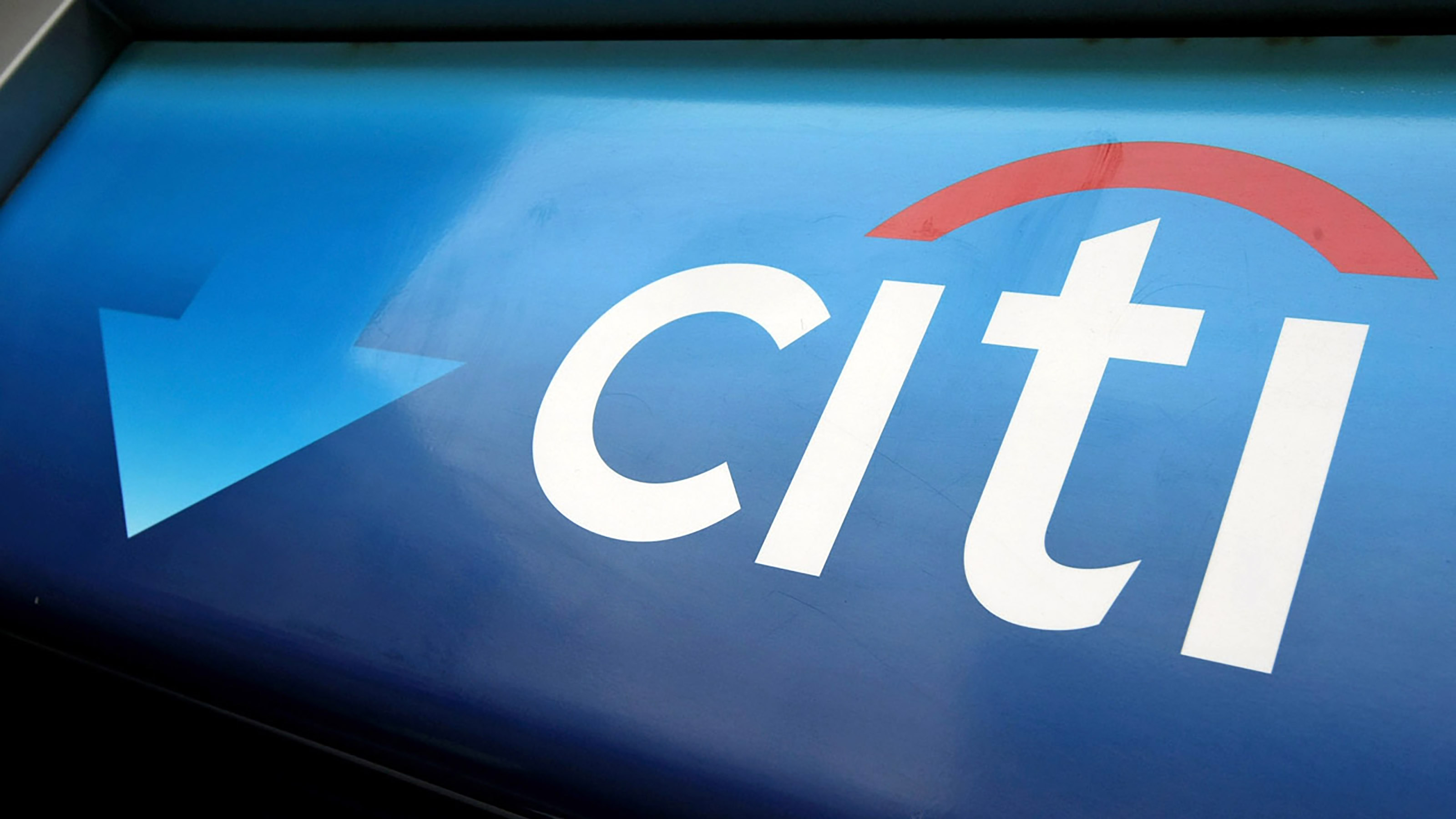
10. Citigroup
- Market value: $90.9 billion
- Dividend yield: 4.7%
- Analysts' average rating: 1.71
Federal regulators recently hit Citigroup (C, $43.68) with a $400 million penalty for "longstanding deficiencies" related to the bank's internal controls and risk management practices – and that's actually good news, analysts say.
Piper Sandler, which rates the stock at Overweight (Buy), says the resolution of the federal action could be a positive catalyst for C's share price.
"While it may seem odd to think of regulatory consent orders as a potential positive, the removal of related fear and uncertainty may provide some relief," says Piper Sandler. "The imposed limitations and penalties seem quite manageable to us and are meaningfully less severe than implied the decline in C's share price since press reports of the consent orders surfaced back on 09/14/20."
More recently, Citigroup just reported better-than-expected third-quarter earnings. "Credit costs have stabilized; deposits continued to increase," CEO Michael Corbat said in the earnings release.
The Street remains bullish on the nation's fourth-largest bank by assets. Of 25 analysts covering the stock tracked by S&P Global Market Intelligence, 12 call it a Strong Buy, eight have it at Buy and five say Hold.
If Citigroup hits the analysts' target for average annual earnings growth over the next three to five years, it'd be expanding at a respectable 7.9% clip.

9. Coca-Cola
- Market value: $215.7 billion
- Dividend yield: 3.3%
- Analysts' average rating: 1.71
Equity income investors have always looked to Coca-Cola (KO, $50.22) as a fount of dividends. The Dow stock has increased its payout every year for 58 consecutive years. And with interest rated plumbing the depths, analysts say the fizzy drinks maker looks like a good bet for income and stability in a rocky market.
In the shorter term, KO stock will be attuned to recovery from the pandemic, as lockdowns hurt its sales to restaurants, bars, cafeterias, sports venues and other public gathering places. Argus Research says KO, more than most, can bounce back from these setbacks.
"We believe that earnings probably bottomed in 2Q20 and should begin to improve as economies reopen," says Argus Research, which calls the stock a Buy. "Reflecting its financial strength, the company was able to issue $5 billion of new bonds amid the crisis, highlighting investor confidence in the company's long-term prospects."
The 21 analysts covering KO are mostly bulls – 10 rate it at Strong Buy, with another seven saying Buy. The remaining pros say Coca-Cola is merely a Hold.
As far as future earnings go, Wall Street wants to see average annual profit growth of 5.2% over the next three to five years. And their consensus target price of $54.43 gives the stock implied upside of about 8% over the next year.
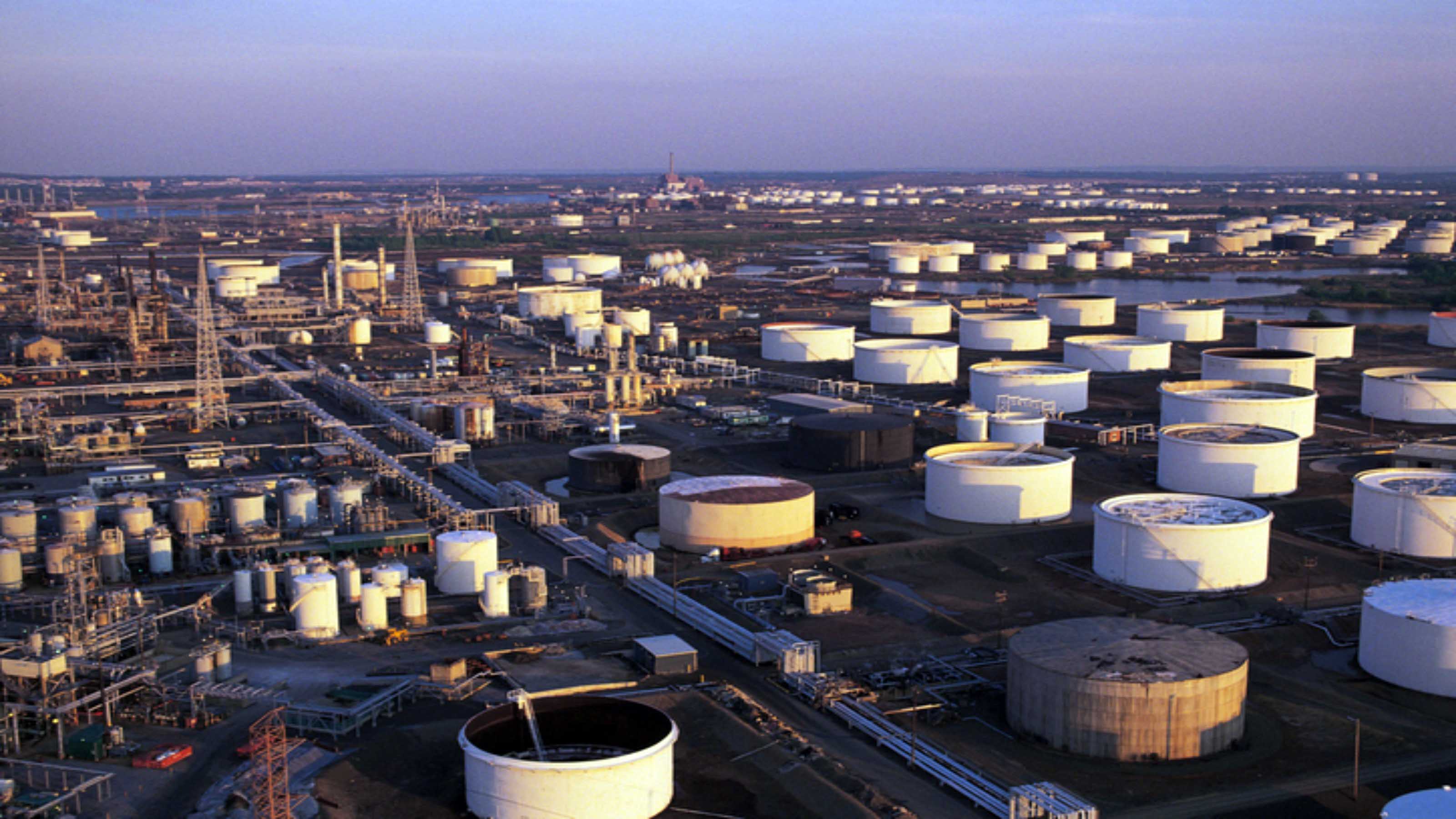
8. Valero Energy
- Market value: $16.9 billion
- Dividend yield: 9.5%
- Analysts' average rating: 1.67
Companies like Valero Energy (VLO, $41.43), which manufactures gasoline, diesel, ethanol and petrochemical products, are looking at net losses amid low oil prices and a sluggish global economy. But those that are best able to survive now and thrive later are the Street's favorites.
"We believe that a company's balance sheet strength and place on the cost curve are critical, and favor those refining and marketing companies that are well positioned to manage a potentially long period of low oil prices," says Argus Research, which calls the stock a Buy. "We believe that VLO is one of these companies as it benefits from its size, scale, and diversified business portfolio, which includes refining, midstream, chemicals, and marketing and specialty operations."
This year won't be pretty; Wall Street is modeling an adjusted net loss of $2.74 per share this year. The good news is VLO is forecast to swing back to profitability with earnings per share of $2.73 in 2021. Next year's revenues are expected to rebound by 28% to $81.6 billion, too.
For all its problems, VLO is popular among the pros. Ten of the 21 analysts covering Valero call it a Strong Buy, and nine say Buy. The remaining pair are split between Hold and Sell. As a group, they expect modest average annual profit growth of 5% over the next three to five years.

7. Baker Hughes
- Market value: $13.3 billion
- Dividend yield: 5.6%
- Analysts' average rating: 1.66
Oil-field services companies have been slammed by low prices for crude oil, but some look poised for outperformance once the upturn begins.
Driller Baker Hughes (BKR, $12.86) is one such company, analysts say.
"Baker Hughes is one of our favorite names and a member of the Stifel Select List," say Stifel analysts, who rate the stock at Buy. "It remains a favorite name due to its diverse portfolio, solid backlog, global footprint, exposure to energy transition, and its healthy balance sheet."
They continue to say that Baker Hughes dominates the liquid natural gas equipment market, and add that cost-cutting, improved efficiency and a likely improving market should bolster oilfield service results in 2022, if not sooner.
Stifel isn't alone in laying out the bull case. Fifteen analysts call BKR a Strong Buy, nine say Buy and five have it at Hold. Collectively, they expect the company to deliver 8.3% average annual earnings growth over the next three to five years.
Better still, their average 12-month price target sits at $20.66 – a 60%-plus surge from current prices.

6. Phillips 66
- Market value: $22.4 billion
- Dividend yield: 7.0%
- Analysts' average rating: 1.65
Argus Research, which covers a large number of energy stocks, makes a Buy case for Phillips 66 (PSX, $51.27) that's similar to its bullishness on Valero.
To sum it up: Only the strong might survive this era of low oil prices.
"PSX benefits from its size, scale, and diversified business portfolio, which includes refining, midstream, chemicals, and marketing and specialty operations," say Argus analysts. "This diversification has proven valuable in different commodity price environments, and, despite fluctuating refining margins, we believe the company's cash flow is less volatile than that of most pure-play refiners."
Most importantly for dividend investors, Argus Research notes that PSX also has a long history of returning excess cash to shareholders in the form of cash distributions and share buybacks.
Earnings projections for the next three to five years are modest, at about 4.5% annual growth. Still, this is a strongly bullish camp – eight Strong Buys, 11 Buys and one Hold – that expects 53% upside, as implied by their average $78.65 price target.

5. Broadcom
- Market value: $154.3 billion
- Dividend yield: 3.4%
- Analysts' average rating: 1.64
Investors looking for growth shouldn't ignore Broadcom (AVGO, $381.46) these days. It's among the best semiconductor stocks on offer right now, and analysts expect the chipmaker to generate average annual earnings growth of 10.8% over the next three to five years.
But Broadcom is more than growth: It also sports a healthy dividend yield of more than 3%. That combination of price appreciation and income has made a lot of fans on the Street. Indeed, 19 analysts rate shares at Strong Buy and eight say Buy, five have it at Hold and a single analyst calls it a Sell.
Part of the optimism on AVGO stems from its position as a supplier for Apple (AAPL) and its wildly popular iPhone. Demand for Broadcom's chips should get a tailwind as the iPhone and other smartphones are upgraded to run to 5G networks.
Also boosting the bull case is the fact that AVGO isn't a one-trick pony. It also supplies software and devices used in applications such as center networking, home connectivity, set-top boxes, and more. That diversity should serve the company well, analysts say.
"We expect work-from-home tailwinds and AVGO's next-generation product launches (Tomahawk, Trident, Jericho, ASICs, etc.) to drive sustained demand from cloud and telecom customers within its networking business (which is approximately 25% of AVGO revenue), says Deutsche Bank, which rates the stock at Buy.

4. ConocoPhillips
- Market value: $37.4 billion
- Dividend yield: 4.9%
- Analysts' average rating: 1.56
If it isn't clear by now, the Street currently loves dividend stocks from the energy sector. And ConocoPhillips (COP, $34.88), an oil and gas exploration and production company, gets some of Street's highest praise.
COP suspended its share repurchase program in April as the global economy ground to a halt because of COVID-19. However, UBS, which rates COP at Buy, notes that the company has restarted buybacks, which is a very good sign.
"The re-initiation of the buyback highlights the confidence of management and its balance sheet strength," UBS says. "The buyback is expected to be funded with the cash on the balance sheet, with pace and level being at the discretion of management."
Of the 27 analysts covering the stock tracked by S&P Global Market Intelligence, 15 say it's a Strong Buy, nine say Buy and three have it at Hold. They also see a big year ahead of COP – a $49.52 average price target implies more than 40% upside from here.

3. NRG Energy
- Market value: $8.1 billion
- Dividend yield: 3.6%
- Analysts' average rating: 1.56
Not all utility stocks were safe havens during the market crash. NRG Energy (NRG, $33.21) was among the laggards and remains down by 16% in 2020.
But NRG nonetheless is popular among the analyst crowd. The electric company gets six Strong Buy recommendations, one Buy and two Holds, according to S&P Global Market Intelligence. And they see about 30% upside over the next 12 months, which is epic by utility standards.
UBS, which rates shares at Buy, looks favorably on a deal struck in July whereby NRG will acquire Canadian utility Centrica's retail U.S. energy business for $3.6 billion. The analysts add that NRG is targeting annual dividend growth of 7% to 9%.
Wall Street expects next year's adjusted earnings to grow 8.8% and 10.7% in 2022. That's not a bad growth rate for a utility, a sector that is known for being poky. With shares trading at just 6.3 times 2022 earnings, NRG does look like a bargain.
7 Best 5G Stocks for the Communication Revolution

2. The Williams Companies
- Market value: $23.6 billion
- Dividend yield: 8.2%
- Analysts' average rating: 1.54
The Williams Companies (WMB, $19.42), which operates interstate gas pipelines, is another energy infrastructure stock analyst expect to rally as the energy market slowly recovers.
"Energy investors want free cash flow, after dividends and capital expenditures, but with a balance sheet that is already in good shape or quickly getting there," says U.S. Capital Advisors as part of its Buy call on WMB.
More cautiously, Argus Research rates the stock at Hold, citing an uptick in gas supplies.
"Meaningful increases in natural gas capacity would continue to pressure gas prices," Argus says. "We continue to believe that natural gas will displace coal as a cleaner source of energy, but need to see more evidence that natural gas inventories are being worked off."
The great majority of analysts, however, remain solidly bullish on the name. Of the 24 analysts covering the stock tracked by S&P Global Market Intelligence, 14 rate it at Strong Buy, seven say Buy and three have it at Hold.
Williams also offers a 1-2 punch, if analysts' price targets are … well, on target. They're spying $24.65 per share within the next year, which implies 27% upside. Add in the 8.2% yield, which is tops among these 25 dividend stocks, and the potential total return sits around 35%.

1. Diamondback Energy
- Market value: $4.8 billion
- Dividend yield: 4.9%
- Analysts' average rating: 1.5
Diamondback Energy (FANG, $30.41) currently sits atop this list of the analysts' favorite generous dividend stocks. Of the 34 analysts covering FANG tracked by S&P Global Market Intelligence, 21 have it at Strong Buy and nine call it a Buy. Only four analysts rate it at Hold and no one has it at Sell.
Diamondback Energy is a "unicorn in the oil patch" because it offers growth and defensive characteristics, say Stifel analysts, who rate the stock at Buy. "We believe the stock's relatively low cost of supply, balance sheet and minerals ownership are a few of the reasons the company is well-positioned."
Credit Suisse, also with a Buy call, says FANG is one of its top picks in the oil exploration and production industry. Helpfully, FANG has no exposure to federal lands, notes CFRA (also Buy), which makes the sunsetting of permits immaterial for the firm.
Seaport Global says FANG is a Buy based on its operational excellence with breadth across "the most compelling parts" of the southwest's Permian Basin.
The pros' long-term growth forecast is particularly bullish, with average annual earnings growth pegged at 13.5% over the next three to five years. At the same time, FANG trades at an inexpensive 9.6 times next year's earnings and just 6.2 times 2022 earnings.
And an average target price of $58.96 means analysts expect Diamondback's stock will shoot well more than 90% higher over the next year.
Profit and prosper with the best of Kiplinger's advice on investing, taxes, retirement, personal finance and much more. Delivered daily. Enter your email in the box and click Sign Me Up.

Dan Burrows is Kiplinger's senior investing writer, having joined the publication full time in 2016.
A long-time financial journalist, Dan is a veteran of MarketWatch, CBS MoneyWatch, SmartMoney, InvestorPlace, DailyFinance and other tier 1 national publications. He has written for The Wall Street Journal, Bloomberg and Consumer Reports and his stories have appeared in the New York Daily News, the San Jose Mercury News and Investor's Business Daily, among many other outlets. As a senior writer at AOL's DailyFinance, Dan reported market news from the floor of the New York Stock Exchange.
Once upon a time – before his days as a financial reporter and assistant financial editor at legendary fashion trade paper Women's Wear Daily – Dan worked for Spy magazine, scribbled away at Time Inc. and contributed to Maxim magazine back when lad mags were a thing. He's also written for Esquire magazine's Dubious Achievements Awards.
In his current role at Kiplinger, Dan writes about markets and macroeconomics.
Dan holds a bachelor's degree from Oberlin College and a master's degree from Columbia University.
Disclosure: Dan does not trade individual stocks or securities. He is eternally long the U.S equity market, primarily through tax-advantaged accounts.
-
 5 Vince Lombardi Quotes Retirees Should Live By
5 Vince Lombardi Quotes Retirees Should Live ByThe iconic football coach's philosophy can help retirees win at the game of life.
-
 The $200,000 Olympic 'Pension' is a Retirement Game-Changer for Team USA
The $200,000 Olympic 'Pension' is a Retirement Game-Changer for Team USAThe donation by financier Ross Stevens is meant to be a "retirement program" for Team USA Olympic and Paralympic athletes.
-
 10 Cheapest Places to Live in Colorado
10 Cheapest Places to Live in ColoradoProperty Tax Looking for a cozy cabin near the slopes? These Colorado counties combine reasonable house prices with the state's lowest property tax bills.
-
 Dow Adds 1,206 Points to Top 50,000: Stock Market Today
Dow Adds 1,206 Points to Top 50,000: Stock Market TodayThe S&P 500 and Nasdaq also had strong finishes to a volatile week, with beaten-down tech stocks outperforming.
-
 Stocks Sink With Alphabet, Bitcoin: Stock Market Today
Stocks Sink With Alphabet, Bitcoin: Stock Market TodayA dismal round of jobs data did little to lift sentiment on Thursday.
-
 Dow Leads in Mixed Session on Amgen Earnings: Stock Market Today
Dow Leads in Mixed Session on Amgen Earnings: Stock Market TodayThe rest of Wall Street struggled as Advanced Micro Devices earnings caused a chip-stock sell-off.
-
 Nasdaq Slides 1.4% on Big Tech Questions: Stock Market Today
Nasdaq Slides 1.4% on Big Tech Questions: Stock Market TodayPalantir Technologies proves at least one publicly traded company can spend a lot of money on AI and make a lot of money on AI.
-
 Fed Vibes Lift Stocks, Dow Up 515 Points: Stock Market Today
Fed Vibes Lift Stocks, Dow Up 515 Points: Stock Market TodayIncoming economic data, including the January jobs report, has been delayed again by another federal government shutdown.
-
 Stocks Close Down as Gold, Silver Spiral: Stock Market Today
Stocks Close Down as Gold, Silver Spiral: Stock Market TodayA "long-overdue correction" temporarily halted a massive rally in gold and silver, while the Dow took a hit from negative reactions to blue-chip earnings.
-
 Nasdaq Drops 172 Points on MSFT AI Spend: Stock Market Today
Nasdaq Drops 172 Points on MSFT AI Spend: Stock Market TodayMicrosoft, Meta Platforms and a mid-cap energy stock have a lot to say about the state of the AI revolution today.
-
 S&P 500 Tops 7,000, Fed Pauses Rate Cuts: Stock Market Today
S&P 500 Tops 7,000, Fed Pauses Rate Cuts: Stock Market TodayInvestors, traders and speculators will probably have to wait until after Jerome Powell steps down for the next Fed rate cut.
